Related Research Articles

Sandra Day O'Connor was an American attorney, politician, and jurist who served as an associate justice of the Supreme Court of the United States from 1981 to 2006. O'Connor was the first woman to serve as a U.S. Supreme Court justice. She was a moderate conservative. Nominated by President Ronald Reagan, she was considered a swing vote for the Rehnquist Court and the first four months of the Roberts Court. Before O'Connor's tenure on the Court, she was an Arizona state judge and earlier an elected legislator in Arizona, serving as the first female majority leader of a state senate as the Republican leader in the Arizona Senate. Upon her nomination to the Court, O'Connor was confirmed unanimously by the United States Senate.
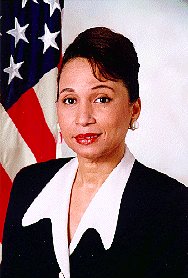
Alexis Margaret Herman formerly served as the 23rd U.S. Secretary of Labor under President Bill Clinton; she was the first African-American to hold the position. Prior to serving as Secretary, she was Assistant to the President and Director of the White House Office of Public Engagement.

James Addison Baker III is an American attorney, diplomat and statesman. A member of the Republican Party, he served as the 10th White House Chief of Staff and 67th United States Secretary of the Treasury under President Ronald Reagan and the 61st U.S. Secretary of State before returning as the 16th White House Chief of Staff under President George H. W. Bush.

Jeane Duane Kirkpatrick was an American diplomat and political scientist who played a major role in the foreign policy of the Ronald Reagan administration. An ardent anticommunist, she was a longtime Democrat who became a neoconservative and switched to the Republican Party in 1985. After serving as Ronald Reagan's foreign policy adviser in his 1980 presidential campaign, she became the first woman to serve as United States Ambassador to the United Nations.
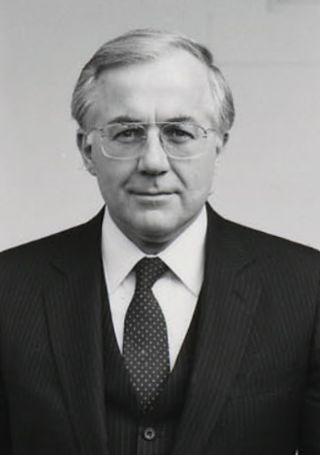
Richard Vincent Allen is a former United States National Security Advisor serving President Ronald Reagan from 1981 to 1982. In 1977, prior to Reagan's presidential election in November 1980, he served as Reagan's chief foreign policy advisor. Since 1983, he has been a fellow at the Hoover Institution. He is a past member of the Defense Policy Board Advisory Committee.

John Dimitri Negroponte is an American diplomat. In 2018, he was a James R. Schlesinger Distinguished Professor at the Miller Center for Public Affairs at the University of Virginia. He is a former J.B. and Maurice C. Shapiro Professor of International Affairs at the George Washington University's Elliott School of International Affairs. Prior to this appointment, he served as a research fellow and lecturer in international affairs at Yale University's Jackson Institute for Global Affairs, United States Deputy Secretary of State (2007–2009), and the first ever Director of National Intelligence (2005–2007).
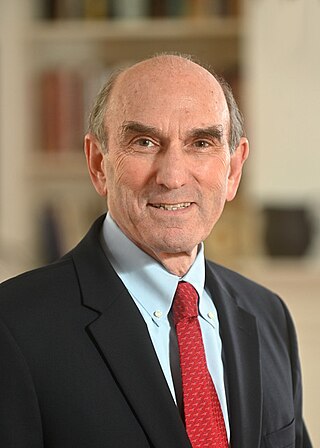
Elliott Abrams is an American politician and lawyer, who has served in foreign policy positions for presidents Ronald Reagan, George W. Bush, and Donald Trump. Abrams is considered to be a neoconservative. He is currently a senior fellow for Middle Eastern studies at the Council on Foreign Relations. He served as the U.S. Special Representative for Venezuela from 2019 to 2021 and as the U.S. Special Representative for Iran from 2020 to 2021.
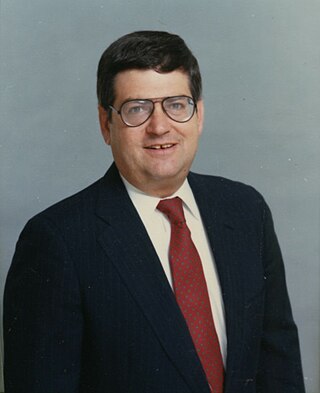
Kenneth Marc Duberstein was an American lobbyist who served as U.S. president Ronald Reagan's White House Chief of Staff from 1988 to 1989.

Ronald Reagan's tenure as the 40th president of the United States began with his first inauguration on January 20, 1981, and ended on January 20, 1989. Reagan, a Republican from California, took office following his landslide victory over Democrat incumbent president Jimmy Carter and independent congressman John B. Anderson in the 1980 presidential election. Four years later, in the 1984 presidential election, he defeated former Democratic vice president Walter Mondale, to win re-election in a larger landslide. Due to U.S. Constitutional law, Reagan was limited to two terms and was succeeded by his vice president, George H. W. Bush, who won the 1988 presidential election. Reagan's 1980 landslide election resulted from a dramatic conservative shift to the right in American politics, including a loss of confidence in liberal, New Deal, and Great Society programs and priorities that had dominated the national agenda since the 1930s.

Anne Legendre Armstrong was a United States diplomat and politician. She was the first woman to serve as Counselor to the President and as United States Ambassador to the United Kingdom, serving in those capacities under the Ford, Nixon, and Carter administrations. She was the recipient of the Presidential Medal of Freedom in 1987.

Angola and the United States have maintained cordial diplomatic relations since 1993. Before then, antagonism between the countries hinged on Cold War geopolitics, which led the U.S. to support anti-government rebels during the protracted Angolan Civil War.
Ronald Reagan was the 40th president of the United States from 1981 to 1989. Previously, he was the 33rd governor of California from 1967 to 1975 and acted in Hollywood films from 1937 to 1964, the same year he energized the American conservative movement. Reagan's basic foreign policy was to equal and surpass the Soviet Union in military strength, and put it on the road to what he called "the ash heap of history". By 1985, he began to cooperate closely with Soviet leader Mikhail Gorbachev, whom he became friends and negotiated large-scale disarmament projects with. The Cold War was fading away and suddenly ended as the Soviets lost control of Eastern Europe almost overnight in October 1989, nine months after Reagan was replaced in the White House by his vice president, George H. W. Bush, who was following Reagan's policies. The dissolution of the Soviet Union took place in December 1991. In terms of the Reagan Doctrine, he promoted military, financial, and diplomatic support for anti-communist insurgencies in Afghanistan, Nicaragua, and numerous other countries. For the most part, local communist power collapsed when the Soviet Union collapsed.
The White House staff position of liaison to the American Jewish community is a role charged with serving as a presidential administration's voice to the community and gathering the community's consensus viewpoint on issues affecting it for the benefit of White House policymakers. It has existed at least as early as the Carter Administration.
Cecile B. Kremer is an American political advisor who has worked for United States Presidents Ronald Reagan, George H.W. Bush and George W. Bush. She has also held senior positions with trade and non-profit associations.

Dorcas Ruth Hardy Spagnolo was an American healthcare specialist. She served as the 10th Commissioner of the Social Security Administration (SSA) from 1986 to 1989. She was the first woman to serve as SSA Commissioner. Hardy held conservative views and remained active in politics after her tenure.

The Walter Mondale 1984 presidential campaign began on February 21, 1983, when Walter Mondale, a former Minnesota senator and vice president of the United States, announced that he was running for president in a speech at the Minnesota State Capitol. Mondale won the Democratic Party's presidential nomination after convincing Frank Lautenberg, a previously unpledged party delegate, to support him. Lautenberg's vote gave Mondale the 1,967 delegate votes needed to become the Democratic Party's nominee. Mondale picked Geraldine Ferraro, a U.S. representative from New York, as his running mate. Mondale lost the general election, held on November 6, 1984, to incumbent Republican President Ronald Reagan in a landslide. Had Mondale been elected, he would have been the first U.S. president from Minnesota and the first non-incumbent vice president since Richard Nixon to take office as president. Ferraro would also have been the country's first female vice president, and the first person from New York since Nelson Rockefeller to become vice president, whereas her husband, John Zaccaro, would also have been the country's first second gentleman.

Joe Biden assumed office as President of the United States on January 20, 2021. The president has the authority to nominate members of his Cabinet to the United States Senate for confirmation under the Appointments Clause of the United States Constitution.

James Wilson "Bud" Nance was a United States Navy officer who was the 10th Deputy National Security Advisor from 1981 to 1982, also briefly the acting National Security Advisor. A childhood friend of Senator Jesse Helms, he later worked as a Congressional aide.
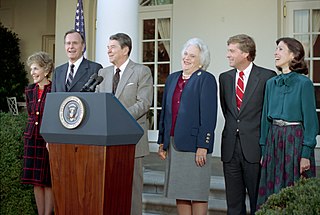
The presidential transition of George H. W. Bush began when then-Vice President Bush won the United States 1988 United States presidential election, becoming the president-elect, and ended when Bush was inaugurated at noon EST on January 20, 1989.

The presidential transition of Ronald Reagan began when he won the 1980 United States presidential election, becoming the president-elect, and ended when Reagan was inaugurated at noon EST on January 20, 1981.
References
- 1 2 3 4 5 6 7 8 Nossiter, Bernard D. (May 3, 1983). "American Woman Will Head Office of U.N. in Washington". The New York Times . ISSN 0362-4331 . Retrieved January 5, 2023.
- 1 2 3 4 "President Clinton Names Six Members to the Commission for the Preservation of America's Heritage Abroad" (PDF). The White House. June 5, 1996. Retrieved January 5, 2023.
- 1 2 3 Gamarekian, Barbara (September 15, 1986). "Washington Talk: Working Profile; A Bridge Between U.N. and Capital: Phyllis Kaminsky". The New York Times . ISSN 0362-4331 . Retrieved January 5, 2023.
- ↑ Cheshire, Maxine (August 9, 1981). "The White House Staffer &". The Washington Post . ISSN 0190-8286 . Retrieved January 5, 2023.
- 1 2 3 4 "Kaminsky, Phyliss: Files, 1981" (PDF). Reagan Library Collections. October 6, 2016. Retrieved January 5, 2023.
- 1 2 Salerno, Heather (April 7, 1997). "Consultant Kaminsky's Dictum: Credibility, Candor, Contacts". The Washington Post . Retrieved January 5, 2023.
- ↑ Conroy, Sarah Booth (May 18, 1983). "Celebrating the United Nations". The Washington Post . ISSN 0190-8286 . Retrieved January 5, 2023.
- ↑ "U.N. Secretary-General Javier Perez de Cuellar Tuesday appointed Reagan..." UPI . May 3, 1983. Retrieved January 5, 2023.
- ↑ Hendrix, Kathleen (March 28, 1985). "Gearing Up for End of U.N. Decade for Women". Los Angeles Times . Retrieved January 5, 2023.
- ↑ Epstein, Edward (May 26, 2003). "The U.N.'s flag-waving fan / Congressman's position bucks the Bush administration". SFGATE . Retrieved January 5, 2023.
- ↑ "Appointments". georgewbush-whitehouse.archives.gov. Retrieved 2023-01-05.
- ↑ "Nominations Sent to the Senate". The White House. January 16, 2019. Retrieved January 5, 2023.